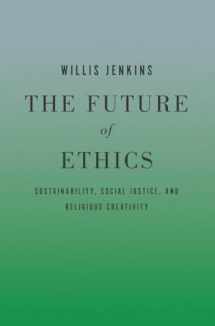
The Future of Ethics: Sustainability, Social Justice, and Religious Creativity
ISBN-13:
9781626160170
ISBN-10:
1626160171
Author:
Willis Jenkins
Publication date:
2013
Publisher:
Georgetown University Press
Format:
Paperback
304 pages
Category:
Christian Living
,
Christian Books & Bibles
FREE US shipping
Rent
35 days
Due Jul 13, 2024
35 days
from $32.73
USD
Book details
ISBN-13:
9781626160170
ISBN-10:
1626160171
Author:
Willis Jenkins
Publication date:
2013
Publisher:
Georgetown University Press
Format:
Paperback
304 pages
Category:
Christian Living
,
Christian Books & Bibles
Summary
The Future of Ethics: Sustainability, Social Justice, and Religious Creativity (ISBN-13: 9781626160170 and ISBN-10: 1626160171), written by authors
Willis Jenkins, was published by Georgetown University Press in 2013.
With an overall rating of 3.6 stars, it's a notable title among other
Christian Living
(Christian Books & Bibles) books. You can easily purchase or rent The Future of Ethics: Sustainability, Social Justice, and Religious Creativity (Paperback) from BooksRun,
along with many other new and used
Christian Living
books
and textbooks.
And, if you're looking to sell your copy, our current buyback offer is $0.3.
Description
The Future of Ethics interprets the big questions of sustainability and social justice through the practical problems arising from humanity's increasing power over basic systems of life. What does climate change mean for our obligations to future generations? How can the sciences work with pluralist cultures in ways that will help societies learn from ecological change?
Traditional religious ethics examines texts and traditions and highlights principles and virtuous behaviors that can apply to particular issues. Willis Jenkins develops lines of practical inquiry through "prophetic pragmatism," an approach to ethics that begins with concrete problems and adapts to changing circumstances. This brand of pragmatism takes its cues from liberationist theology, with its emphasis on how individuals and communities actually cope with overwhelming problems.
Can religious communities make a difference when dealing with these issues? By integrating environmental sciences and theological ethics into problem-based engagements with philosophy, economics, and other disciplines, Jenkins illustrates the wide understanding and moral creativity needed to live well in the new conditions of human power. He shows the significance of religious thought to the development of interdisciplinary responses to sustainability issues and how this calls for a new style of religious ethics.
Traditional religious ethics examines texts and traditions and highlights principles and virtuous behaviors that can apply to particular issues. Willis Jenkins develops lines of practical inquiry through "prophetic pragmatism," an approach to ethics that begins with concrete problems and adapts to changing circumstances. This brand of pragmatism takes its cues from liberationist theology, with its emphasis on how individuals and communities actually cope with overwhelming problems.
Can religious communities make a difference when dealing with these issues? By integrating environmental sciences and theological ethics into problem-based engagements with philosophy, economics, and other disciplines, Jenkins illustrates the wide understanding and moral creativity needed to live well in the new conditions of human power. He shows the significance of religious thought to the development of interdisciplinary responses to sustainability issues and how this calls for a new style of religious ethics.


We would LOVE it if you could help us and other readers by reviewing the book
Book review

Congratulations! We have received your book review.
{user}
{createdAt}
by {truncated_author}


